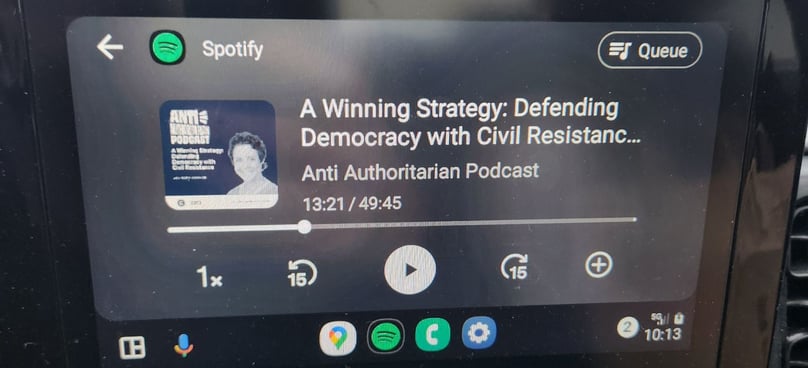Civil Resistance
Unpacking key concepts in the November 28, 2024 episode of Anti Authoritarian Podcast


In the past month or so, as Jason and I have continued our quest to absorb antifascist content ahead of the second inauguration of Donald Trump, I have become increasingly familiar with Scot Nakagawa, an "activist-organizer," as he puts it on Linked In, with "35+ years of experience in tracking, analyzing, and mounting responses to vigilante white supremacist and white nationalist groups and the evangelical rightwing." Yeah, so Scot's a badass. He's also the cohost of Anti Authoritarian podcast, as I discovered when Jason sent me this picture from the road.
Within the first five minutes of listening to this episode, I wanted to be scribbling down notes.
The brilliant bits
The guest for this conversation is Maria Stephan (if all of these names are new to you, come sit by me). She coauthored a book with Erica Chenoweth entitled Why Civil Resistance Works: The Strategic Logic of Nonviolent Conflict. One of the key findings in that book - based on a broad examination of 20th-century attempts to resist authoritarianism - is that nonviolent efforts have double the success rates of violent ones, in large part because nonviolent resistance draws more support and more participation. "Mass, diverse support" is the key to achieving your goals as a movement.
Here are a few of the other great things she says:
Authoritarianism (like democracy) relies upon "pillars of support," including religious institutions, military and policing institutions, businesses, etc.
Strategic nonviolence is a "methodology for waging struggle, prosecuting conflict without the threat or use of physical violence"
It uses direct action (boycotts, sit-ins, walkouts, protests, etc.) "to shift power," "encourage defection" away from the supporting pillars, and "impose costs" for supporting authoritarianism and injustice
As an example of defection, she talks about nuns joining in protests, and soldiers who were unwilling to menace, intimidate, or harm nuns defecting away from the military pillar
Movements that innovate and develop a broad range of methods are "harder to repress"
Movements gain resilience by investing in infrastructure (alternative underground schools, clinics, news resources)
Movements that are prepared to be met with violence - and to maintain nonviolent discipline in the fact of that violence - have a better chance of success
We need innovation now more than ever (the success rates of traditional tactics such as protesting are at an all-time low, based on Chenoweth's latest research)
Scot and Maria are also working together on a project that makes attempts to use political violence against segments of the population backfire, but we'll cover that in another post.
My observations
For now, I'll make these humble observations:
Jason and I learned earlier this year how the rich are historically big supporters (and even instigators) of fascism, since the alternative in their minds is some version of socialism that drains their coffers
The rich men leading our media organizations are currently lining up in the most depressing ways to kiss the ring and avoid retaliation - but also to protect if not expand their coffers (which makes me think that defection will not occur until it's clear that they will pay a greater economic and reputational cost for their submission than they would for resisting)
Shifting power is important language for a key idea
